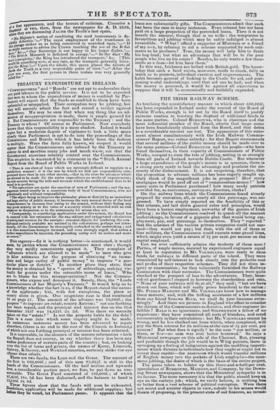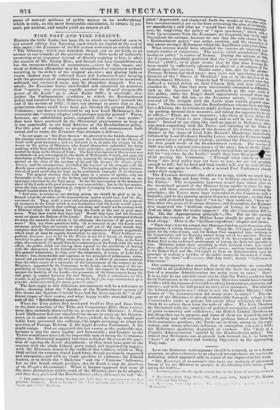THE IRISH RAILWAY SCHEME.
As touching the unsatisfactory mariner in which about 600,000/. has been expended in Ireland under the control of the Board of Public Works, enough is let out by the Board itself to justify extreme caution in trusting the disrisal of additional funds to the same parties. Colonel BURGOYNE, who is chairman and the most influential member of the Board, admits that large sums have been fraudulently obtained from the Board, and that debts to a considerable amount are lost. The appearance of this state- ment almost simultaneously with the Irish Railway Commis-
sioners' Report, was rather unlucky; for that Report recommends that several millions of the public money should be made over to
the same parties—Colonel BURGOYNE and his people—who have found themselves, in their capacity of Commissioners of Public Works, unequal to stem the tide of jobbing, setting in so strongly
from all parts of Ireland towards Dublin Castle. But whenever a large expenditure of the people's money is in question, there, is a strong party ready to laud the advantage and proclaim the ne- cessity of the disbursement. It is not surprising, therefore, that the proposition to advance millions has been eagerly caught up. Only think of the magnificent jobs in prospect ! How many mortgages would be paid off out of" compensation-money !" how marry seats in Parliament purchased ! how many needy patriots provided for, as contractors, surveyors, directors, clerks On the railway lines which the Commissioners found already prepared for execution, all, or nearly all this patronage, was en- grossed. To have simply reported on the feasibility of this or that scheme, and laid down general rules and principles, would have been a barren employment, unworthy of the genius of Irish jobbing : so the Commissioners resolved to quash all the nascent undertakings, in favour of a gigantic plan that would bring em- ployment, pay, and patronage to themselves. They " reported" that the schemes of the various private companies could not suc- ceed—they would not pay; but that, with the aid of three or four millions, the Commissioners could execute some grand lines, which might even yield a return of 31 per cent. per annum on the capital employed.
Can we ever sufficiently admire the modesty of these men ? Parties, of ample means, assisted by experienced engineers equal at least in reputation to Mr. VIGNOLLES, were ready to raise funds for railways in different parts of the island. They were stimulated by self-interest to look closely into the probable cost and profits of their respective schemes. They did not shun in- quiry or examination ; for they voluntarily furnished the Railway Commission with their estimates. The Commissioners were quite shocked at the prospect of loss to the adventurers. They, bene- volent gentlemen ! stepped in between the shareholders and ruin. " None of your railways will do at all," they said ; "but we have struck out lines, which will really prove beneficial to the nation: Mr. PIERCE MAHON'S,' and Mr. VIGNOLLES know how to manage these matters; and, with the trilling assistance of a few millions from our friend Seetera Rica, we shall do your business swim- mingly." And there are persons in England who affect to consider the dictum of the Commissioners as decisive, and their engineer in. fallible! BALD is au ignoramus, and STEPHENSON a fellow of no experience: they have committed all sorts of blunders, and erred inconceivably in their calculations: but Mr. V restoesiis cannot be wrong, and be has chalked out lines which, when completed, will pay the State interest for its millions at the rate of 3i per cent. per annum! But what does it signify? be the sum "one million, or three, or five—no sum was ever better bestowed." So says a Ministerial newspaper on this side of the Channel. But, pleasing and profitable though the job would be to Whig patriots, there is springing up a feeling of indignation against the meddling imperti- nence which dictates to individuals how they ought or ought not to invest their capital—the assurance which would transfer millions of English money into the pockets of Irish etnployirs—the enor- mous jobbing, the desire of which is the basis of the entire project. The pains taken to bolster up this three-and-a-half-per cent. speculation of BURGOYNE, Illsitoriv,and Company, by the Down- ing Street newspapers, shows that the Ministerial sympathy is in its favour. The more necessary it is that the public should keeping eye on the embryo job; which, we verily believe, is nothing less or better than a vast scheme of political corruption. Were there not secret and sinister objects in view, nobody in his senses would dream of proposing, in the present state of out finances, an invest. rnent of several millions of public money in an unffertaking which is only, on the most favourable calculation, to return 3i per cent. per annum, and might yield no return at all.



























 Previous page
Previous page